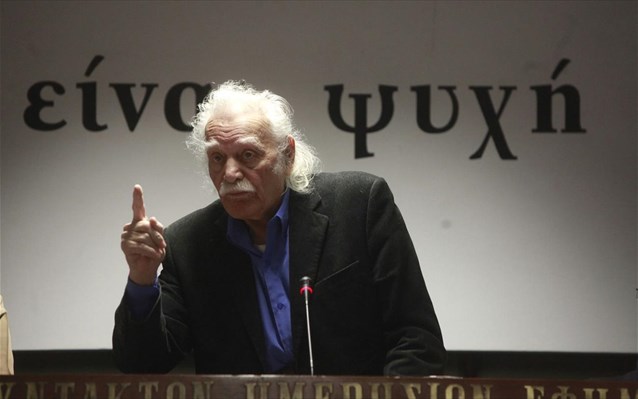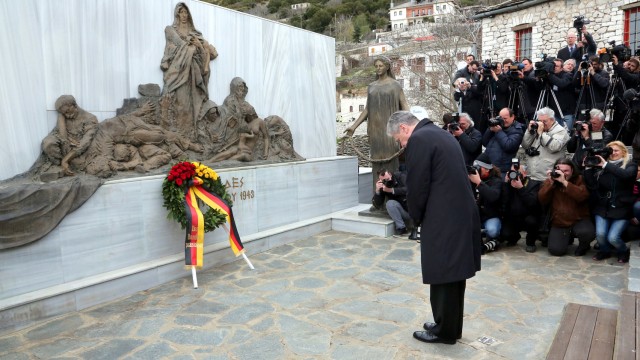Anastasia Balezdrova
There is no signed armistice agreement between the two countries, only a contract that they are not in a military conflict. This entitles Berlin to deny that it owes compensation for the damage caused to Greece, as stated by members of the National Council for Asserting Debts of Germany to Greece.
At a press conference, which was organized in the hall of the Journalists' Union in Athens, they presented the arguments that are the basis of their request. Hero of the Greek resistance and a SYRIZA deputy in the present Greek parliament Manolis Glezos said that the attempts to force Germany to pay the amounts due had begun in 1946. The organization has existed for 20 years and although it has become particularly popular since the outbreak of the economic crisis, it turns out that it has constantly acted in favour of the cause.
The veteran politician, a journalist by profession, as he emphasized, presented the facts. According to the organization, Germany owes money to both the Greek state and individuals who suffered damage during the invasion.

"The debts to the state are three. The first is related to the reparations for the destruction of the Greek economy after the occupation of Greece by the Nazi troops. The sum is $7,100 billion with a nominal value of 1938, which, according to the Bank of Greece, today is equivalent to 108 billion euro and it was determined by the Balkan Commission in Paris in 1946. Germany argues that it does not owe the money but, at the same time, Bulgaria and Italy have paid their reparations under that decision. If it is not valid Greece should return the money paid by the two countries," said Glezos.
The second obligation of Germany to Greece is associated with the so-called "war" loan that Greece was forced to grant to the occupying troops. It was to the amount of $3.5 billion of 1938 or 54 billion euro. According to various sources, in the first years after the war, Germany had paid several instalments of this loan, "which means that it has recognized its debts under it."
Thirdly, Glezos quoted the archaeological finds and works of art that the Nazi troops had stolen from Greece. "Every time I meet with representatives of Germany I ask about them but I have never received an answer as to why they do not want to return them at least."
Glezos said that he had raised the issue of the debts to current German President Joachim Gauck during his visit to Greece earlier this month. "We received a response from Minister of Finance Wolfgang Schaeuble alone who said that these things were left in the past and we must look forward. However, only three years ago, Germany obliged the Czech Republic to pay compensation to Sudeten Germans, and in May 2013, the government in Berlin decided to pay pensions to Israeli citizens who have survived World War II," he stressed, adding that Greece is the only country that has not been compensated after the war.
During the press conference, the amount of the damage to individual Greeks was not announced. According to the organization, over 100 different villages were set on fire and many of their inhabitants were brutally killed by the Nazi troops. One of them was Lingiades, where the German President chose to apologize to Greece for the actions of Nazi Germany. "We recognize that apology as a very important step, even though it was made with 70 years’ delay. But how sincere can it be if it is not accompanied by actions?" said Aristomeis Singelakis who, along with other members of the organization, had unfurled a banner reading "Justice and compensation" immediately after Joachim Gauck's speech in Lingiades.

German historian Prof. Christoph Schminck-Gustavus, who wrote about the destruction of the village by German soldiers, took part in the press conference via Skype. "I was there by accident in 1990 and saw a ruined village. The people told me what had happened and I wrote it down. None of them talked about reparations, they just wanted the history of the village to become part of the history of the war. Therefore, I wrote the trilogy that was published in Ioannina. I am not a politician and I am ashamed when I see the German President apologizing as he did earlier in France and Italy. Apologizing without assuming your responsibility is easy. And Germany has debts due to the inhuman actions of its troops in Greece," he said.
The organization accused the Greek governments of never having taken action to assert these debts. Lawyer Christina Stamouli said that "From June 2000 to today, all governments have refused to provide us with a permit from the Minister of Justice, as stipulated in the law, which will allow the individuals to file claims against Germany at the International Court in The Hague." She referred to the case of the brutal massacre in Distomo, which was rejected by the international tribunal and pointed out, "From a legal point of view the decision of the court advises the parties not to submit claims but to sit at the negotiating table and resolve their dispute. Of course, this applies to Germany and Italy, but also to Greece as long as it has a political will for this."